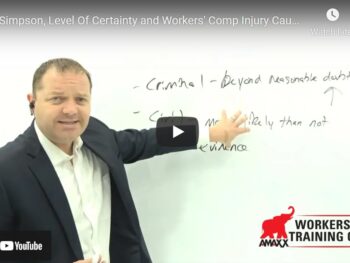Attorney fees for disability have had a long, troubled history In the USA. In the late 19th century, lawsuits for disability began to surge, especially among poorer workers in dangerous employments. The ethical rules at the time did not allow for contingent fees, but how else could a poor, recent immigrant, obtain a lawyer to handle a disability lawsuit?
When employer liability laws emerged in the decades after the Civil War, the worker received the benefit of having three traditional defenses lifted, i.e., contributory negligence, assumption of the risk and the fellow servant rule. With those barriers gone, many lawyers in northeastern cities jumped at the chance of representing many new arrivals.
Volume of Potential Claims Led To Ambulance Chasing
But the sheer volume of potential claims led to ambulance chasing and fast, cheap settlements. By the early years of the 20th century, the situation had grown so bad that court calendars in major cities were clogged with dubious negligence claims (the worthy claims were becoming hidden under them) and an industry of locating and steering workers to attorneys, themselves members of recently arrived group, was quickly growing.
The response was workers compensation laws, enacted not to make benefits easier, but to restrict the tsunami of bad claims. In the early laws, and still on the books, were regulation of attorney fees, which required approval of the comp board in order to be collected. Another feature in some state laws was the eyebrow raising requirement that attorney fees were in no case to be contingent on a percentage of the worker’s recovery. That meant the fee system that propped up the employer liability laws was to be halted.
Clarence W. Hobbs, first president of the National Council of Workmen’s Compensation (NCCI) and founder of the New York Compensation Insurance Rating Board was blunt in his 1939 book on the early history of comp. The most beneficial change brought by the comp laws was the abolition of contingency fees which, he felt, were solely for the benefit of a “noisome horde of ambulance chasers”.
Today Work Comp Still Dominated By Contingency Fees
So what happened? Today, work comp is dominated by contingency fees. In NY, for example, the comp law continues to have a provision barring percentage contingent recovery, but allows no other fee system in practice. For large final settlements, the fees awarded are 10-15% of the settlement. No fees are ever permitted unless there is a new award, and the fee awarded is always a percentage of the new money awarded.
How did this reversal, without a change in the laws, come about? There appears to have been no conscious intellectual struggle with the law. The change came about solely because contingent fees seemed to be so logical. The entire negligence system, all but universally using contingent fees, couldn’t be wrong, could it? What of the comp law sections barring such fees? Amazingly, it doesn’t appear that anyone was aware of the sections.
What sort of fees did the drafters have in mind, if not percentage contingent? It seems that a fixed modest fee for all attorney appearances was what was anticipated. How did that quickly drift into contingency? It seems that a few decades after the comp laws were passed, the public perception that disability and lawyers were firmly linked by negligence contingency, even if the comp law was never intended to be a mini-negligence system.”Negligence envy” had conquered the comp system.
Follow The Money To Know What Good & What Ill You Will See
All the attempts at reforming comp systems have avoided colliding with the dinosaur at the conference table. A former chief judge of New York’s highest court defended comp contingent fees with the words, “Lawyers should not get more if their clients get less”, but failed to explain how getting more disability was getting less of a result. Effective return to work programs have been the primary victim of that view.
If you know how the lawyers are paid, you will know, well in advance, what good and what ill you will see.
Author: Attorney Theodore Ronca is a practicing lawyer from Aquebogue, NY. He is a frequent writer and speaker, and has represented employers in the areas of workers’ compensation, Social Security disability, employee disability plans and subrogation for over 30 years. Attorney Ronca can be reached at 631-722-2100. medsearch7@optonline.net
Editor Michael B. Stack, CPA, Director of Operations, Amaxx Risk Solutions, Inc. is an expert in employer communication systems and part of the Amaxx team helping companies reduce their workers compensation costs by 20% to 50%. He is a writer, speaker, and website publisher. www.reduceyourworkerscomp.com. Contact: mstack@reduceyourworkerscomp.com.
©2013 Amaxx Risk Solutions, Inc. All rights reserved under International Copyright Law.






















